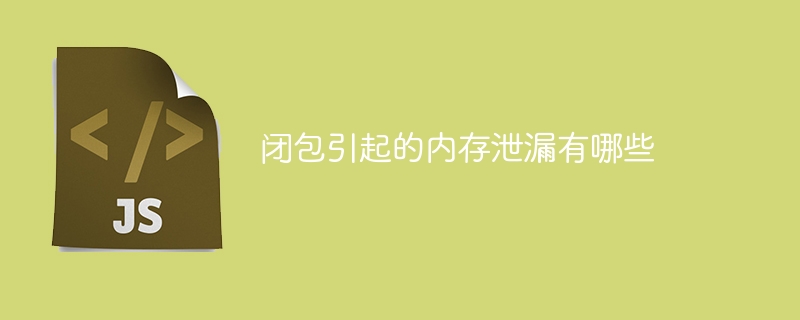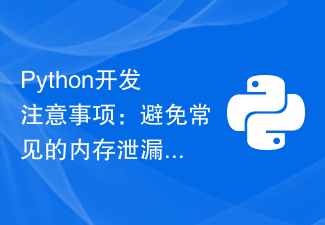C The best practices to prevent memory leaks in memory management include: 1. Use smart pointers (automatically release memory); 2. Use new and delete correctly (used in pairs to avoid dangling pointers); 3. Use RAII (resource Automatically released when out of scope); 4. Detect memory leaks (use tools such as Valgrind).

#Memory management in C technology: How to prevent memory leaks?
In C, developers are responsible for manually managing memory, which brings the possibility of memory leaks. A memory leak occurs when a program fails to free a block of memory that is no longer needed. This gradually consumes available memory, eventually leading to program crashes or performance degradation.
Here are some best practices to prevent memory leaks:
Use smart pointers
Smart pointers automatically manage resources and ensure that memory is automatically released when it is no longer needed. Some common smart pointers include std::unique_ptr, std::shared_ptr, and std::weak_ptr.
Example:
std::unique_ptr<int> ptr = std::make_unique<int>(42);
Use new and delete correctly
Use new only when necessary to allocate memory, and Use delete to free it when no longer needed. Use new and delete in pairs to avoid dangling pointers (pointers pointing to memory that are no longer valid).
Example:
int* p = new int; // 使用 p delete p;
Using RAII (resource acquisition is initialization)
RAII is a design pattern that ensures that resources will be used when the object goes out of scope automatically released. Use RAII to simplify memory management and prevent memory leaks.
Example:
class Resource {
public:
Resource() { /* 获取资源 */ }
~Resource() { /* 释放资源 */ }
};
int main() {
{
Resource r; // 在作用域内获取资源
} // 在作用域结束后自动释放资源
}Detecting memory leaks
Use a memory leak detection tool such as Valgrind to identify and fix memory leaks. These tools provide detailed reports indicating where memory leaks are and how to resolve them.
Practical case:
Suppose we have a function that allocates an array but does not free it:
void my_function() {
int* arr = new int[10];
// ... 使用数组 ...
}Use Valgrind to detect this Memory leaks:
valgrind --leak-check=full --track-origins=yes ./my_program
Valgrind will report memory leaks and their sources as follows:
==40== LEAK SUMMARY: ==40== definitely lost: 40 bytes in 1 blocks
Workaround:
Use before the function exits delete[] Release the array:
void my_function() {
int* arr = new int[10];
// ... 使用数组 ...
delete[] arr;
}The above is the detailed content of Memory management in C++ technology: How to prevent memory leaks?. For more information, please follow other related articles on the PHP Chinese website!
 Windows 上的暗黑破坏神 4 内存泄漏问题:如何修复Apr 13, 2023 pm 09:34 PM
Windows 上的暗黑破坏神 4 内存泄漏问题:如何修复Apr 13, 2023 pm 09:34 PMWindows 上的暗黑破坏神 4 内存泄漏问题:13 种修复方法暗黑破坏神 4 的内存泄漏可能由多种问题引起。该游戏目前仍处于开发阶段,因此可以预料到此类问题。内存泄漏的主要原因似乎是暗黑破坏神 4 中的纹理质量设置。我们建议您从下面提到的第一个修复开始,然后浏览列表直到您设法解决问题。让我们开始吧。方法 1:将纹理质量设置为中或低“高”纹理质量似乎是暗黑破坏神 4 内存泄漏的主要原因。这似乎是一个意想不到的错误,因为拥有高端 GPU 和工作站的用户也报告说这是一个潜在的修复方法。前往您的暗黑
 golang内存泄漏原因有哪些Jan 10, 2023 pm 05:45 PM
golang内存泄漏原因有哪些Jan 10, 2023 pm 05:45 PM泄漏原因有:1、time.After()的使用,每次time.After(duration x)会产生NewTimer(),在duration x到期之前,新创建的timer不会被GC,到期之后才会GC;2、time.NewTicker资源未及时释放;3、select阻塞;4、channel阻塞;5、申请过多的goroutine、goroutine阻塞;6、slice引起的等。
 C#中常见的内存管理问题及解决方法Oct 11, 2023 am 09:21 AM
C#中常见的内存管理问题及解决方法Oct 11, 2023 am 09:21 AMC#中常见的内存管理问题及解决方法,需要具体代码示例在C#开发中,内存管理是一个重要的问题,不正确的内存管理可能会导致内存泄漏和性能问题。本文将向读者介绍C#中常见的内存管理问题,并提供解决方法,并给出具体的代码示例。希望能帮助读者更好地理解和掌握内存管理技术。垃圾回收器不及时释放资源C#中的垃圾回收器(GarbageCollector)负责自动释放不再使
 闭包引起的内存泄漏有哪些Nov 22, 2023 pm 02:51 PM
闭包引起的内存泄漏有哪些Nov 22, 2023 pm 02:51 PM闭包引起的内存泄漏有:1、无限循环和递归调用;2、闭包内部引用了全局变量;3、闭包内部引用了不可清理的对象。详细介绍:1、无限循环和递归调用,当一个闭包在内部引用外部的变量,并且这个闭包又被外部的代码反复调用时,就可能导致内存泄漏,这是因为每次调用都会在内存中创建一个新的作用域,并且这个作用域不会被垃圾回收机制清理;2、闭包内部引用了全局变量,如果在闭包内部引用了全局变量等等。
 解决Go语言开发中的内存泄漏定位问题的方法Jul 01, 2023 pm 12:33 PM
解决Go语言开发中的内存泄漏定位问题的方法Jul 01, 2023 pm 12:33 PM解决Go语言开发中的内存泄漏定位问题的方法内存泄漏是程序开发中常见的问题之一。在Go语言开发中,由于其自动垃圾回收机制的存在,内存泄漏问题相对其他语言来说可能较少。然而,当我们面对大型复杂的应用程序时,仍然可能会出现内存泄漏的情况。本文将介绍一些在Go语言开发中定位和解决内存泄漏问题的常用方法。首先,我们需要了解什么是内存泄漏。简单来说,内存泄漏指的是程序中
 解决闭包导致的内存泄漏问题Feb 18, 2024 pm 03:20 PM
解决闭包导致的内存泄漏问题Feb 18, 2024 pm 03:20 PM标题:闭包引起的内存泄漏及解决方法引言:闭包是JavaScript中一个非常常见的概念,它可以让内部函数访问外部函数的变量。然而,闭包在使用不当的情况下可能导致内存泄漏。本文将探讨闭包引起的内存泄漏问题,并提供解决方法及具体代码示例。一、闭包引起的内存泄漏问题闭包的特性是内部函数可以访问外部函数的变量,这意味着在闭包中引用的变量不会被垃圾回收。如果使用不当,
 Go 内存泄漏追踪:Go pprof 实操指南Apr 08, 2024 am 10:57 AM
Go 内存泄漏追踪:Go pprof 实操指南Apr 08, 2024 am 10:57 AMpprof工具可用于分析Go应用程序的内存使用情况和检测内存泄漏。它提供内存概况生成、内存泄漏识别和实时分析功能。通过使用pprof.Parse生成内存快照,并使用pprof-allocspace命令识别内存分配最多的数据结构。同时,pprof支持实时分析,并提供端点以远程访问内存使用情况信息。
 Python开发注意事项:避免常见的内存泄漏问题Nov 22, 2023 pm 01:43 PM
Python开发注意事项:避免常见的内存泄漏问题Nov 22, 2023 pm 01:43 PMPython作为一种高级编程语言,具有易学易用和开发效率高等优点,在开发人员中越来越受欢迎。但是,由于其垃圾回收机制的实现方式,Python在处理大量内存时,容易出现内存泄漏问题。本文将从常见内存泄漏问题、引起问题的原因以及避免内存泄漏的方法三个方面来介绍Python开发过程中需要注意的事项。一、常见内存泄漏问题内存泄漏是指程序在运行中分配的内存空间无法释放


Hot AI Tools

Undresser.AI Undress
AI-powered app for creating realistic nude photos

AI Clothes Remover
Online AI tool for removing clothes from photos.

Undress AI Tool
Undress images for free

Clothoff.io
AI clothes remover

AI Hentai Generator
Generate AI Hentai for free.

Hot Article

Hot Tools

SublimeText3 Linux new version
SublimeText3 Linux latest version

WebStorm Mac version
Useful JavaScript development tools

Dreamweaver CS6
Visual web development tools

SAP NetWeaver Server Adapter for Eclipse
Integrate Eclipse with SAP NetWeaver application server.

SublimeText3 Chinese version
Chinese version, very easy to use







